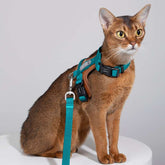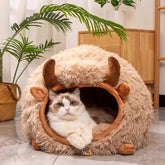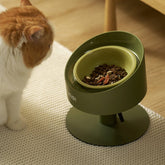Cat Hairballs - Should You Be Concerned?

As a cat parent, you probably already know the notion of cat hairballs all too well. They construe part of the side of living with our furry friends that aren't the most glamorous. But be it as it may, cat balls are something we can’t avoid when having felines running all over the place in our homes, so it might be a good thing to learn a bit about them. This post will be your guide. You'll be able to get a clear understanding of what hairballs are, how they form, and how you can prevent and treat them.
What Are Cat Hairballs?
It's not the most pleasant sighting, that's for sure, but it's a regular part of life living with cats. Hairballs come about as the unsavory result of our furry friends' self-grooming routine. You see, when our furry friends do their cute licks to keep their fur clean, perhaps after a scrumptious treat or just by nature, they will most likely swallow up a couple of hair strands here and there. Over time, the ingested hairs can accumulate into a wet clump in the digestive tract in what is commonly called a hairball.
Are Hairballs a Common Occurrence?
If you are a newbie to cat parenthood, hearing about cat hairballs can get you feeling a little uneasy. But we're here to tell you that it's common for cats to get hairballs, and more so for long-haired cats with all the extra fluff they got strutting around or a furry friend that grooms themselves a little too much than the norm. Most of the time, there is no reason to be troubled as the hairballs usually come out one way or the other, but as other cat parents will tell you, it is by no means a pleasant sight to witness (or hear).
Can you detect a hairball?
Usually, a hairball is 'upchucked' out a few moments after you knew it was there in the first place. Sometimes you may be in proximity moments before you see the hairball appear. As your cat tries to bring out the hairball, you will most likely hear them project a sort of cough, retch, gag-like sound. At first, this may alarm you and leave you concerned, especially if you witness it for the first time. But as unpleasant as it may be, it's just part of the process, although I know it can take time to accept.
Can hairballs get serious?
Most of the time, cats draw out hairballs with no hinges to show, but in rare instances where cats are unable to remove a hairball, this could mean that it could be stuck somewhere along their digestive tract. At this point, you may be quick to spot symptoms such as repeated unproductive retching (trying to remove a hairball without any luck), lethargy, lack of appetite, constipation, or diarrhea. In such instances, the most appropriate thing is to visit a vet to get an expert analysis of the issue and advise on the way forward.
How can you prevent at hairballs?
While I know it might not be the best news to hear, hairballs are just part of the package of cat parenthood. But while there is no 100% way to rid hairballs from our cat homes for good, there are several ways that you can prevent and treat them:

Regular brushing
The truth is, a brush a day keeps the hairballs away. And by having regular brushing sessions with your furry friends, you remove loose fur that would otherwise be licked up and end up as hairballs. Not to mention, it's a pawesome chance to bond with your cats. As we've covered in our cat grooming blog 'Easy Home Cat Grooming For Beginners', brushing about once or twice a week for short-haired cats, and once a day for long-haired cats is a healthy grooming routine that not only keeps their fur looking right, but it also goes a long way in minimizing hairballs for your stars.
Hairball alleviator products
All cats are unique in their way. Some are suckers for fur brushes, while others, not so much. So If your furry friends aren't stans of 'brushing time', then hairball alleviating products can be matchable replacements. They won't prevent your furry friends from soaking up hair during their adorable self-grooming, but they do contain mild laxatives that help ingested hairs pass through their digestive tract with more ease and avoid them from accumulating into hairballs in the stomach. They are also very effective in treating already existing hairballs, so it could be handy to keep some in your medicine drawer if ever the time comes.
Reducing hairballs through food
Some say food is the remedy to all life's problems. When it comes to reducing hairballs, maybe the notion might pass. In today's time and age, many cat food brands make food specifically designed to minimize hairballs through smoother digestion and coat health while not compromising on the yum factor. So as a hairball reduction technique, this is probably the lowest maintenance on your side. It gives your cat something tasty to grub on and makes sure that hairballs are one less thing to worry about, which is a win-win in my book.
Regulate excessive grooming
There comes to a point where too much of something isn't such a good thing, and over grooming for cats falls into this bracket. Sometimes our stars compulsively groom, which can lead to grooming overkill as it only speeds up the forming of hairballs. Most of the time, cats do this due to boredom, and so by adding more entertainment options in their lives, you could deter them from their excessive licking habits. The key is to focus their attention from constantly licking their fur to something else pleasurable. And the great thing is, there's a sea of options ready for the task, from squishy toys to chew on to adventure-filled cat tunnels.























